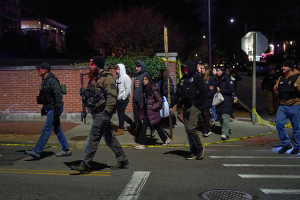Interview: Harry Potter, Witchcraft or Christian Allusion?
From the Sorcerer's Stone to the Half-Blood Prince, the Harry Potter series by J. K. Rowling has captured the heart of both children and adults all around the world. However, with each new book, the novels have also become a hot topic of debate within the theological arena.
While some argue that reading or watching Harry Potter will turn children to witchcraft and black magic, Dr. Scott H. Moore, the Associate Professor of Philosophy at Baylor University, believes Harry Potter instills Christian values and teachings in children as well as adults.
The following are excerpts from an interview with Dr. Moore.
What are some of the Christian allusions and themes that flow constantly throughout the "Harry Potter" series? Can you give some specific examples?
The basic theme of the books is one of the conflict between good and evil. In every book, there is a story of Harry both growing older and coming to understand his unique destiny to fight the evil wizard Voldemort (whose name means “willing death”).
We are told over and over again that Harry represents the power of love, a power which Voldemort cannot understand. Harry’s mother sacrificed herself for him and her love protects him. The books abound with examples of Christ symbols, especially mythological beasts and symbols. The Phoenix (the bird which dies and rises again), the griffin (half eagle/half lion, king of Heaven and Earth), and the unicorn (purity of life and spirit) all figure prominently.
In each book, these Christ symbols come to Harry’s aid in some moment of crisis. In one instance, Harry fights a giant serpent (the traditional symbol of Satan) and the phoenix brings Harry a double-edged sword. In another instance, the song of the phoenix comes to Harry to sustain him and give him strength. Images such as these abound.
Some Christians think Harry Potter promotes witchcraft and even devil worship for children. According to some statistics, the interest in Wicca materials, schools, and spells have doubled since the release of the series. What is your response?
I don’t have the statistics at hand, but I believe that report is in error. It is my understanding (according to a CNN report a week ago on this very subject) that Wiccan groups have actually fallen in their membership. Of course, someone could manipulate the data in a self-serving way which says that the popularity of the Potter books is evidence that “interest” in witchcraft is on the rise. Logically, one can’t prove a connection by assuming the connection to be the case.
More to the point, the “magic” described in the books is exceedingly different from Wiccan “witchcraft,” which offers an aggressive “alternative lifestyle” and there is absolutely no basis for anything remotely resembling “devil worship.” The magic in Harry Potter exemplifies the magic of some of the very best Children’s literature, especially great Christian literature like that of C.S. Lewis and J.R.R. Tolkien. In these stories there have always been witches and wizards and spells and hexes, but they do not endorse an “alternative lifestyle” that one could simply choose to follow (as the Wiccans do).
Non-magical people in the books can’t “become” witches or learn spells, and the magical people are strictly forbidden from using magic in front of or to harm the non-magical community. A big part of the story is that the evil wizard Voldemort has broken these laws and attacked non-magical people in a desperate will to power. Contemporary wiccans and the wizards of the Potter world could not be more different.
Considering not everyone, more so for children, can easily decipher the Christian symbols in the books, is there some danger in leaving the novels to children to explore on their own?
I don’t think children should be left alone with anything—television, video games, music, books, or whatever. Parents should be involved in the lives of their children and we must know what our children are reading, watching, and listening to. That being said, I do not believe that the Potter books pose a “risk” to children. They are classic tales of good versus evil and they affirm and teach great Christian virtues like forgiveness, hope, courage, generosity, and especially love.
For instance, at the end of the third book, Harry Potter and the Prisoner of Azkaban, Harry discovers that it was one of his dad’s best friends who, 13 years earlier, betrayed his father, leading to his parents’ death at the hands of the evil wizard Voldemort. While others want to kill the betrayer, Harry steps in and says “No”, showing mercy and forgiveness. You don’t need any great knowledge of Christian symbols to see basic Christian virtues like forgiveness.
Another important theme in the stories is that of truth-telling. Some people have accused Harry of encouraging children to lie to adults. Anyone who reads the books will readily see that one of the most important lessons that Harry is learning is that of the importance of telling the truth. Early on, he does lie to some adults and it always gets him in trouble. By the the time we get to this latest book, Harry is telling the truth even in the most inconvenient situations because he has learned that he must rely on the truth.
Moreover, most of the wizards in the books are afraid to call Voldemort by name. They refer to him as “he who must not be named” or “you know who.” Very early on in the series, Harry learns the importance of calling things by their proper name, and he has the courage to call Voldemort by his name. Parents who read these books with their children will have opportunities to discuss these important concepts and virtues.
I read that all of your five children have or have had read to them the series. From your experience, what would you recommend the parents to do in their children’s reading of the series?
The older children have read them all (including the latest one). The younger children have had portions of the stories read to them. My advice for parents who are worried about these things is that the parents should read the book first. These last three books are pretty long, but the first three are really quite short.
Parents can read it in a couple of evenings and then decide if it is appropriate for their children. Then, either read it to or with the children and talk about the story. As with all the “chapter books” our younger kids are reading, I will read a page, and then my child will read one. We spend time together; I help him with the harder words, and he becomes a better reader in the process.
Do you have any additional comments?
Parents must decide what is appropriate for their children. Not every book is appropriate for every child. Some children may find the stories a bit scary, and others will simply be interested in other things. Christian parents should not, however, worry that these books foster and promote the occult. They are wonderful books built on the well-formed Christian imagination.
Dr. Scott H. Moore is the Associate Professor of Philosophy at Baylor University where he also serves as Director of Great Texts Program.
Moore earned his Ph.D at Baylor and completed postdoctoral work at University of Notre Dame. Some of his publications are The End of Convenient Stereotypes: Extraordinary Politics at the End of Modernity, Christian History, Providence, and Michel Foucault, and Era and Epoch, Epoch and Era: Christian Intellectuals in the Postmodern Turn.
Moore and his wife and five children (ages 15, 13, 10, 7, 4) are the members of DaySpring Baptist Church.



























